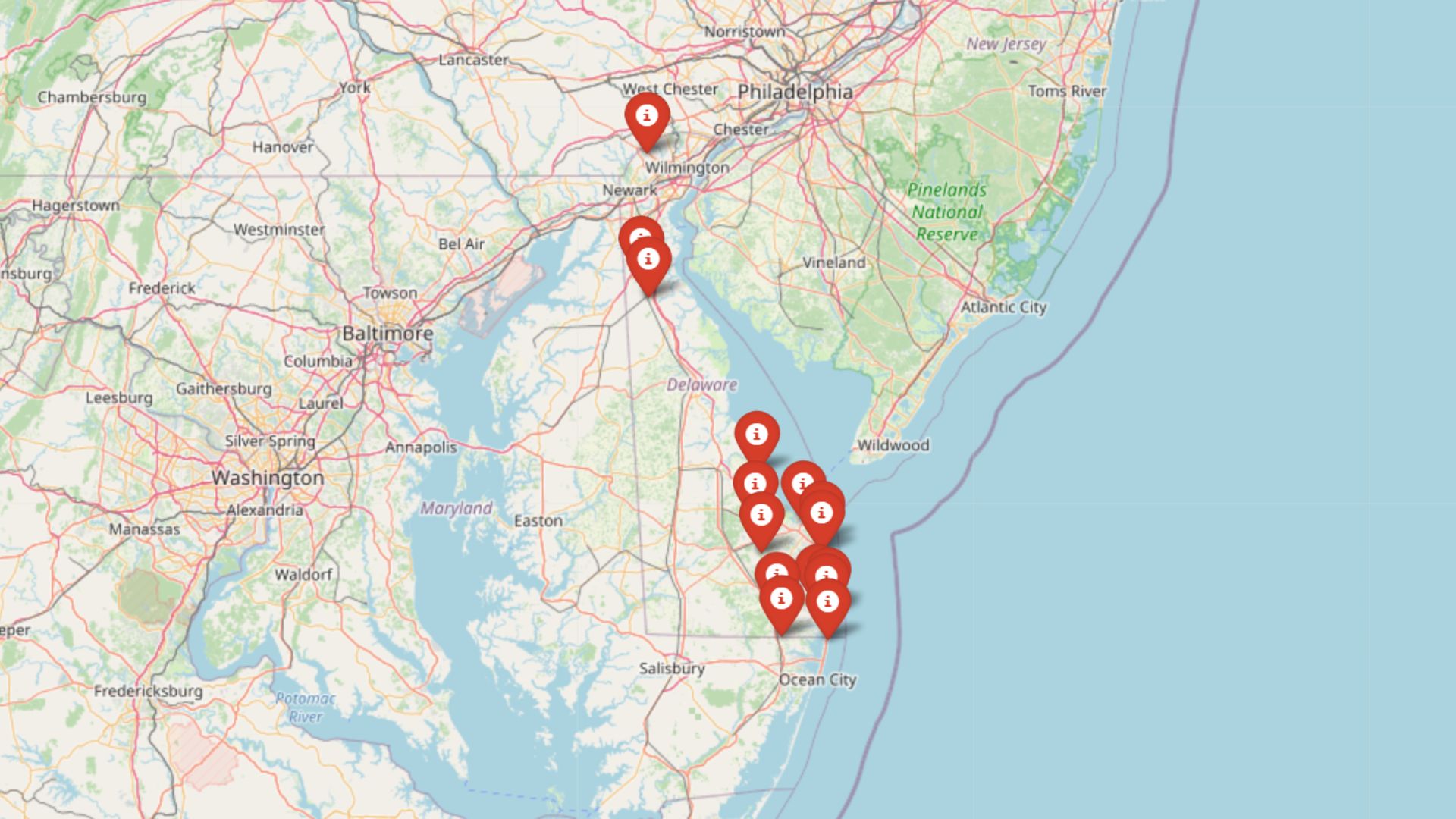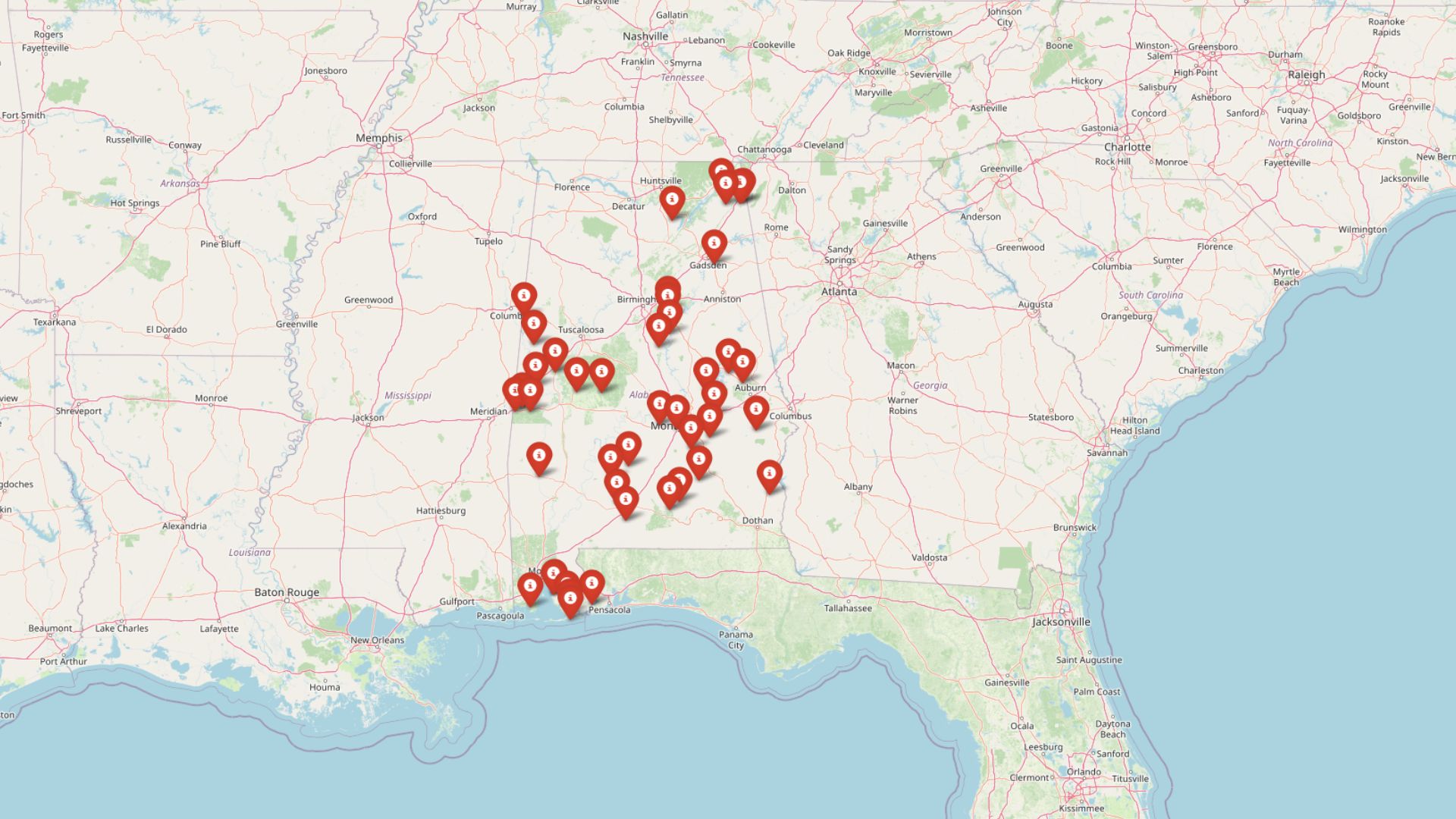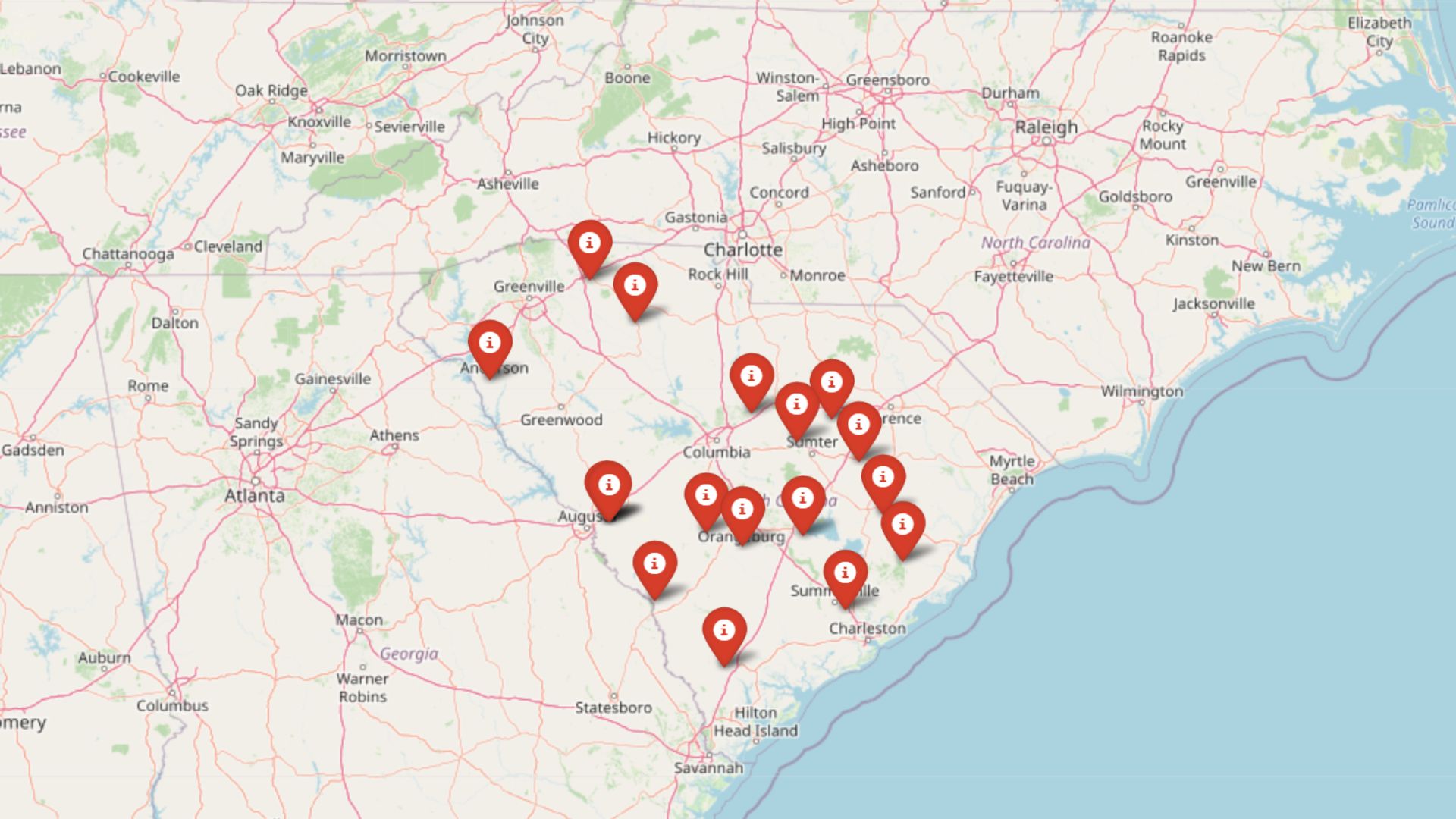
Would you like to save this?
Retirement’s supposed to mean ease—not endless errands, long drives, and limited connection. But new 2025 data from the Overall Retirement Score (ORS) highlights 18 South Carolina towns where retirees are facing more friction than freedom.
Whether it’s spotty transit, few amenities, or just not much going on, these towns score lowest in the state for retirement-friendliness. From isolated rural dots to car-heavy suburbs, they’re places where the golden years may feel a little tarnished.
18. Estill – Limited Senior-Friendly Healthcare
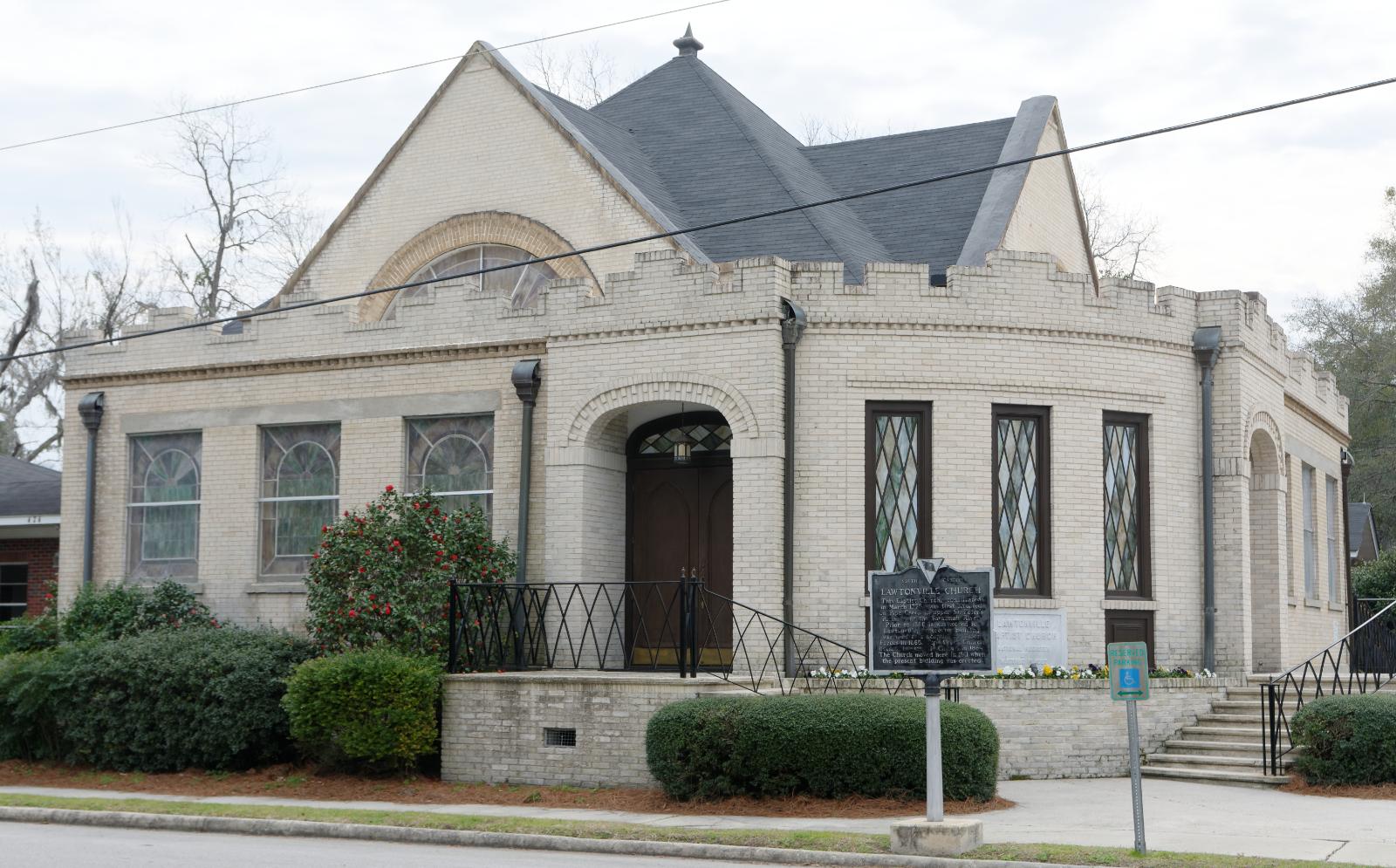
Tucked into Hampton County in the Lowcountry, Estill is a small, quiet town that’s long depended on its agricultural roots. While the peace and slow pace may appeal to some, retirees may struggle with the lack of medical services and senior-focused resources in the area. Estill’s rural location means residents often need to travel long distances for basic healthcare or specialist visits.
The town offers very little in the way of cultural or recreational amenities, and its aging infrastructure doesn’t support a vibrant or connected community feel. Estill may suit those seeking deep rural solitude, but for older adults looking for convenience, activity, and accessibility, the town’s limitations are hard to ignore.
Estill – ORS 26.77
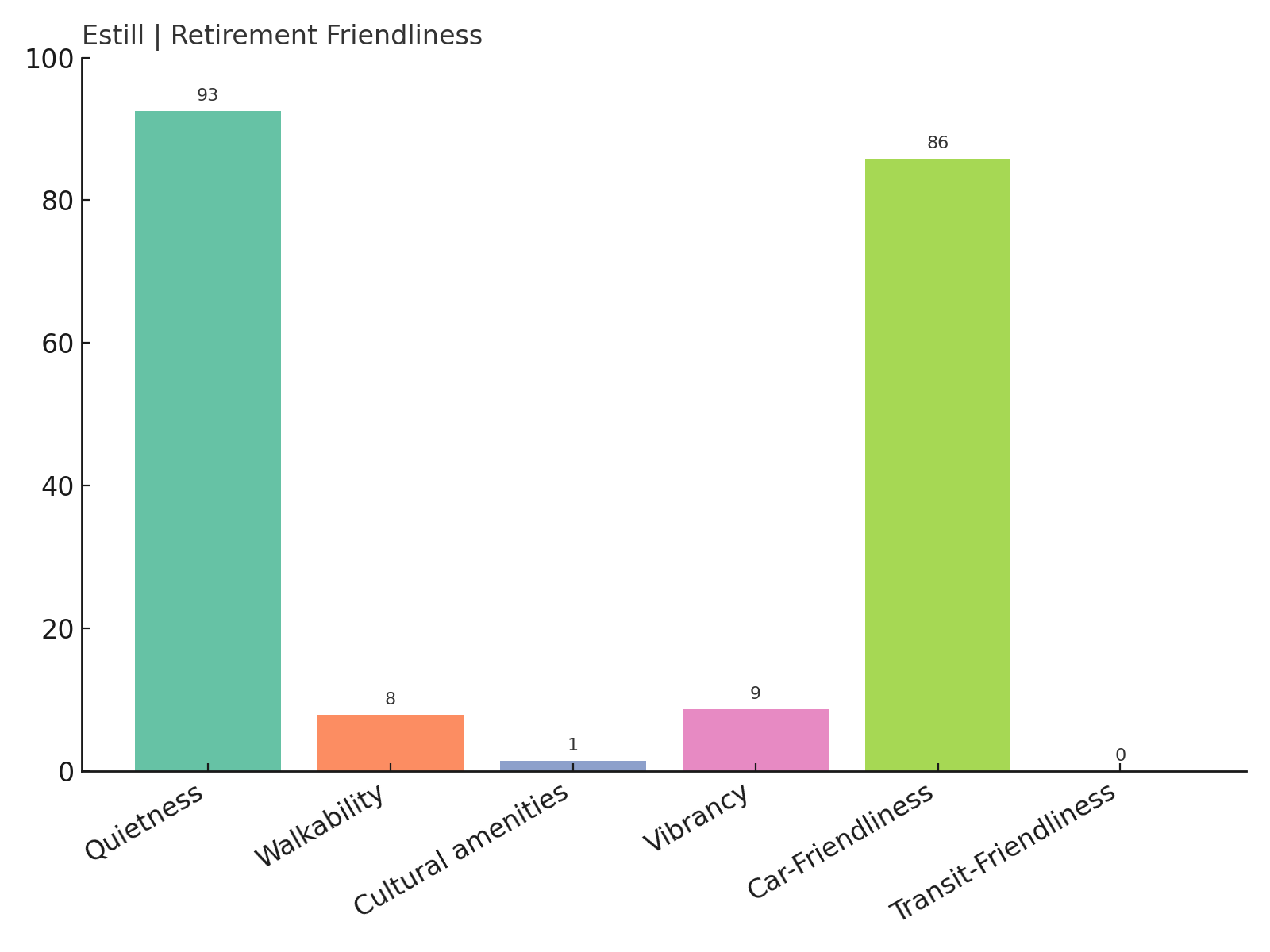
- Overall Retirement Score: 26.77
- Quietness: 92.51
- Walkability: 7.89
- Cultural amenities: 1.44
- Vibrancy: 8.64
- Car-Friendliness: 85.83
- Transit-Friendliness: 0.0
Estill ranks high on quietness but scores very low across almost every other metric that matters for retirees. With walkability and cultural access nearly nonexistent, this is a town where you’ll need a car for everything—and even then, options are sparse.
17. Dalzell – Isolation and Few Amenities
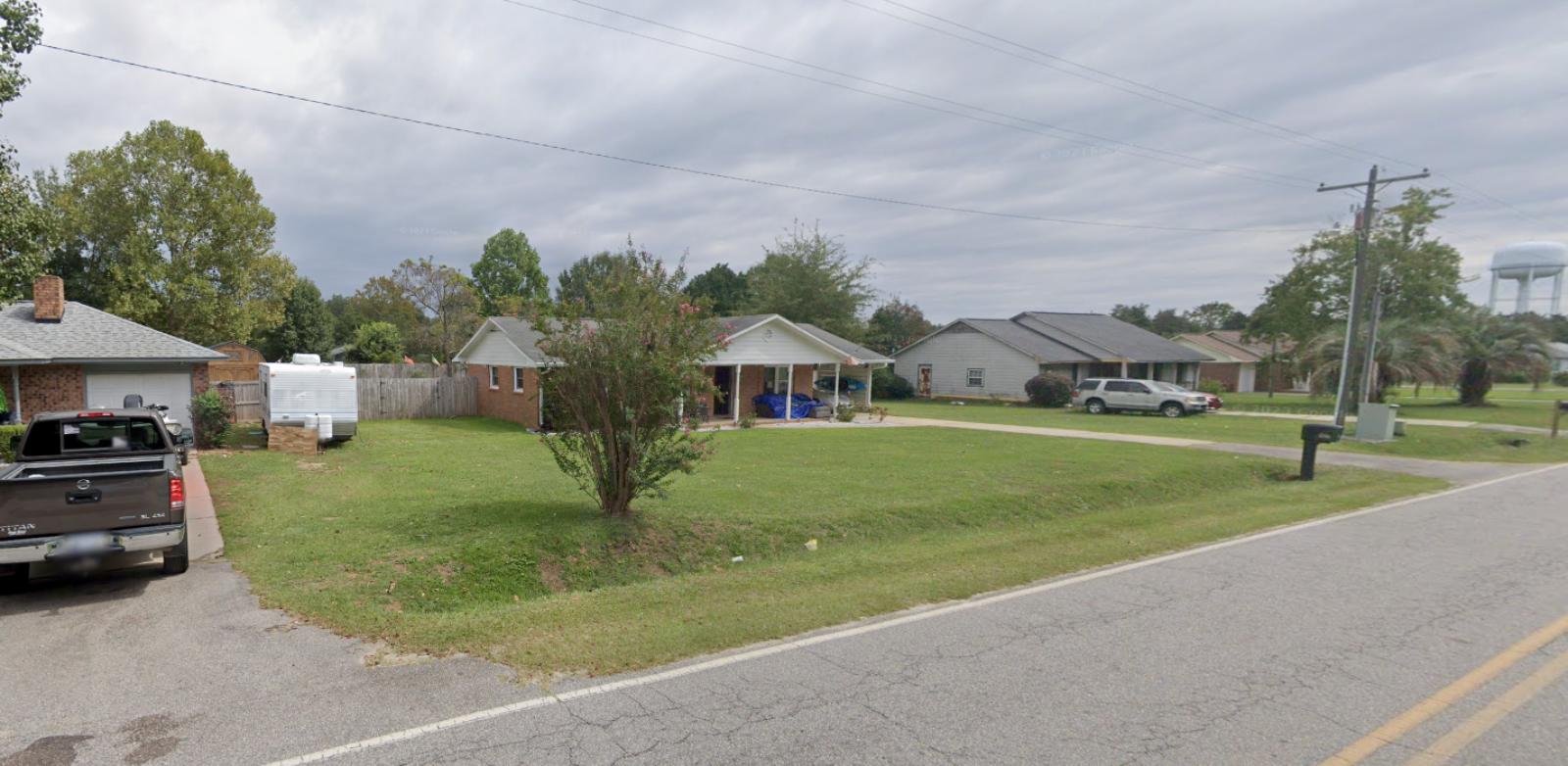
Dalzell sits just outside of Sumter in central South Carolina. While technically close to a larger town, Dalzell itself offers little for retirees who want to stay active or socially connected. There are no downtown amenities, parks, or community centers to speak of, and public transportation is nonexistent.
The area’s semi-rural layout and spread-out homes make it hard for those without cars to manage daily errands. It may work for younger families seeking space, but for older adults looking for connection and convenience, Dalzell presents real limitations.
Dalzell – ORS 26.42
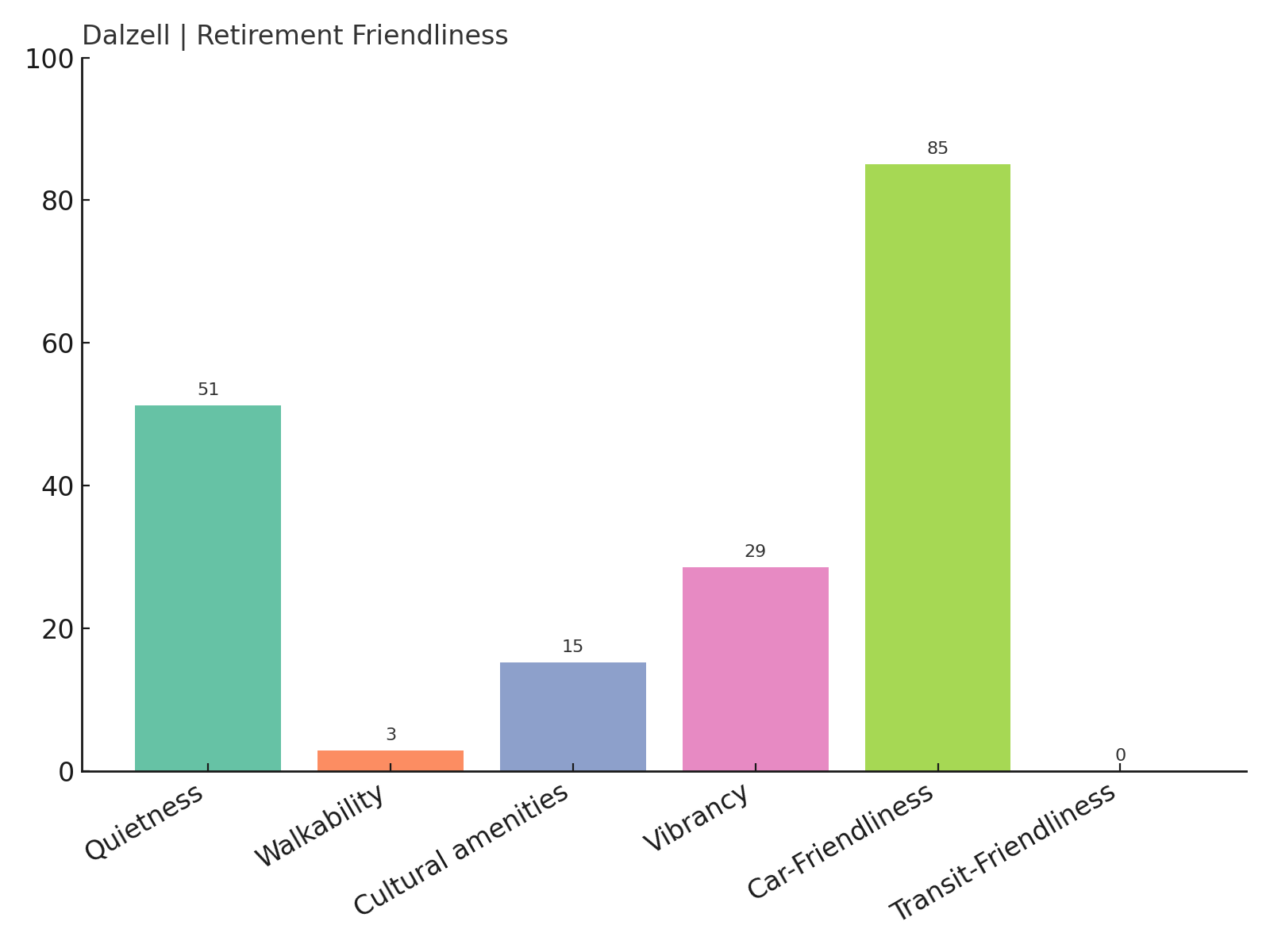
- Overall Retirement Score: 26.42
- Quietness: 51.22
- Walkability: 2.89
- Cultural amenities: 15.17
- Vibrancy: 28.53
- Car-Friendliness: 85.1
- Transit-Friendliness: 0.0
With almost no walkability and zero transit support, Dalzell can be isolating for retirees. Even cultural amenities, while slightly better than some towns, don’t make up for the lack of everyday accessibility or senior-focused infrastructure.
16. Elliott – Sparse Infrastructure and Low Activity

Elliott is a small, unincorporated community in Lee County, where farmland and open space dominate. That may appeal to folks looking for a slower pace of life, but the area falls short when it comes to senior services and community engagement. There are few if any organized activities for older adults, and residents must travel to neighboring towns for essentials.
There’s no real town center to speak of, and the lack of public gathering spaces or cultural programming leaves the community feeling disconnected. Elliott simply lacks the support systems that make a place feel livable for retirees.
Elliott – ORS 26.23
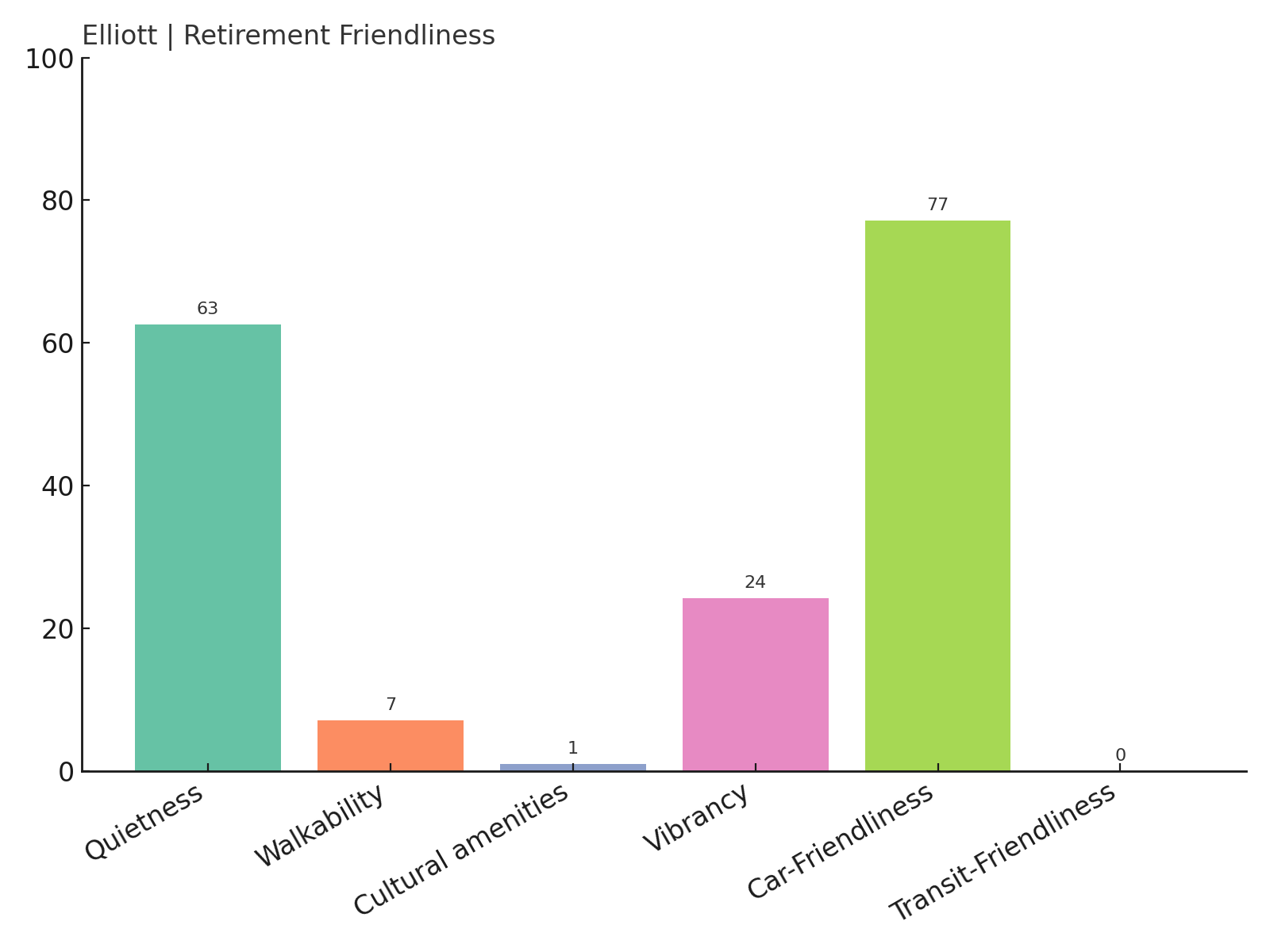
Would you like to save this?
- Overall Retirement Score: 26.23
- Quietness: 62.61
- Walkability: 7.11
- Cultural amenities: 1.02
- Vibrancy: 24.18
- Car-Friendliness: 77.2
- Transit-Friendliness: 0.0
Elliott’s low scores across the board make it difficult for retirees to enjoy a fulfilling, connected life here. Even with a decent level of peace and quiet, the town’s near-total lack of services makes it an impractical place to settle in your later years.
15. Jamestown – Too Quiet for Comfort

Jamestown is a tiny town in Berkeley County near the Francis Marion National Forest. While it offers beautiful natural surroundings, the lack of infrastructure and amenities can be a dealbreaker for older residents. There’s no grocery store in town, no pharmacy, and extremely limited access to healthcare or recreation.
The isolation is real here, and retirees looking for even basic social or cultural outlets will find themselves driving long distances—or simply doing without. What little community activity exists is often spread out and hard to access without a car.
Jamestown – ORS 25.92
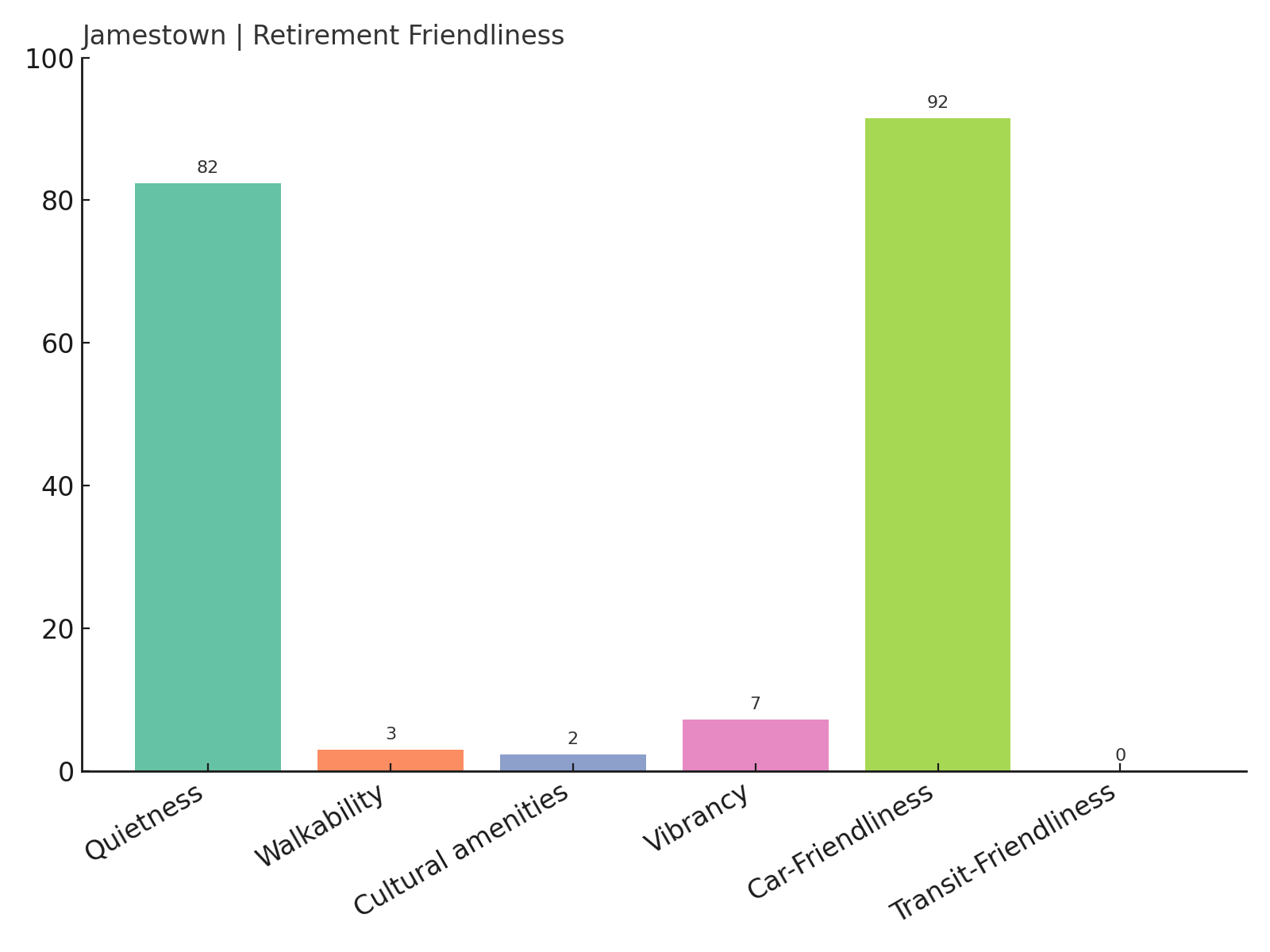
- Overall Retirement Score: 25.92
- Quietness: 82.4
- Walkability: 2.96
- Cultural amenities: 2.31
- Vibrancy: 7.18
- Car-Friendliness: 91.56
- Transit-Friendliness: 0.0
Jamestown scores well on peace and car-friendliness, but the near-zero scores for vibrancy and walkability reveal the challenges. Retirees here are trading convenience and connection for total seclusion—and that tradeoff may be too steep.
14. Ladson – Suburban Sprawl, Senior Disconnect

Located near Summerville in the Charleston metro area, Ladson might seem like a convenient spot on paper. But its rapid suburban development hasn’t come with much in the way of senior-friendly infrastructure. There’s no clear town center, and neighborhoods are mostly car-dependent subdivisions.
Though it’s close to healthcare and shopping options, those without vehicles are left out entirely. It may appeal to younger working families commuting to Charleston, but older adults may feel overwhelmed by the lack of walkability and cohesive community feel.
Ladson – ORS 25.8
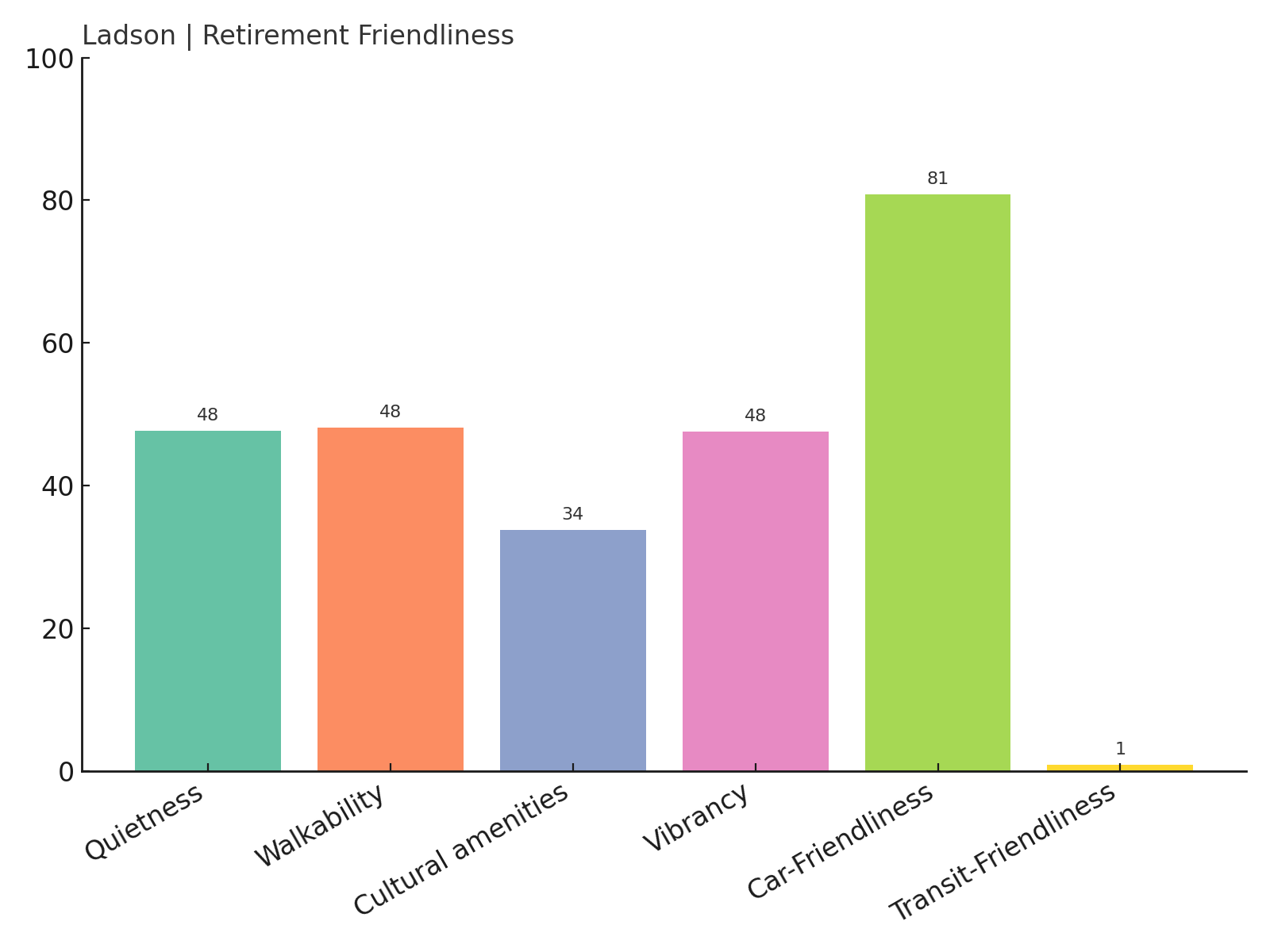
- Overall Retirement Score: 25.8
- Quietness: 47.73
- Walkability: 48.14
- Cultural amenities: 33.76
- Vibrancy: 47.62
- Car-Friendliness: 80.86
- Transit-Friendliness: 0.85
Ladson scores higher on vibrancy and cultural amenities than many towns on this list, but its lower quietness and car-focused layout drag down its retirement appeal. For those who value peace and easy navigation, the sprawl may be more burden than benefit.
13. Elgin – Growing Fast, But Not for Seniors

Elgin is one of the fastest-growing areas northeast of Columbia, and that growth has brought new subdivisions and families to the region. But that boom hasn’t included many resources tailored to retirees. The pace of development has outstripped planning for older adults, with limited senior housing, walkable areas, or centralized amenities.
There are a few shops and services clustered near the highway, but the town lacks a traditional main street or accessible public spaces. Elgin may feel lively, but it’s not designed with aging in mind—and that’s where it falls short for retirees.
Elgin – ORS 25.04
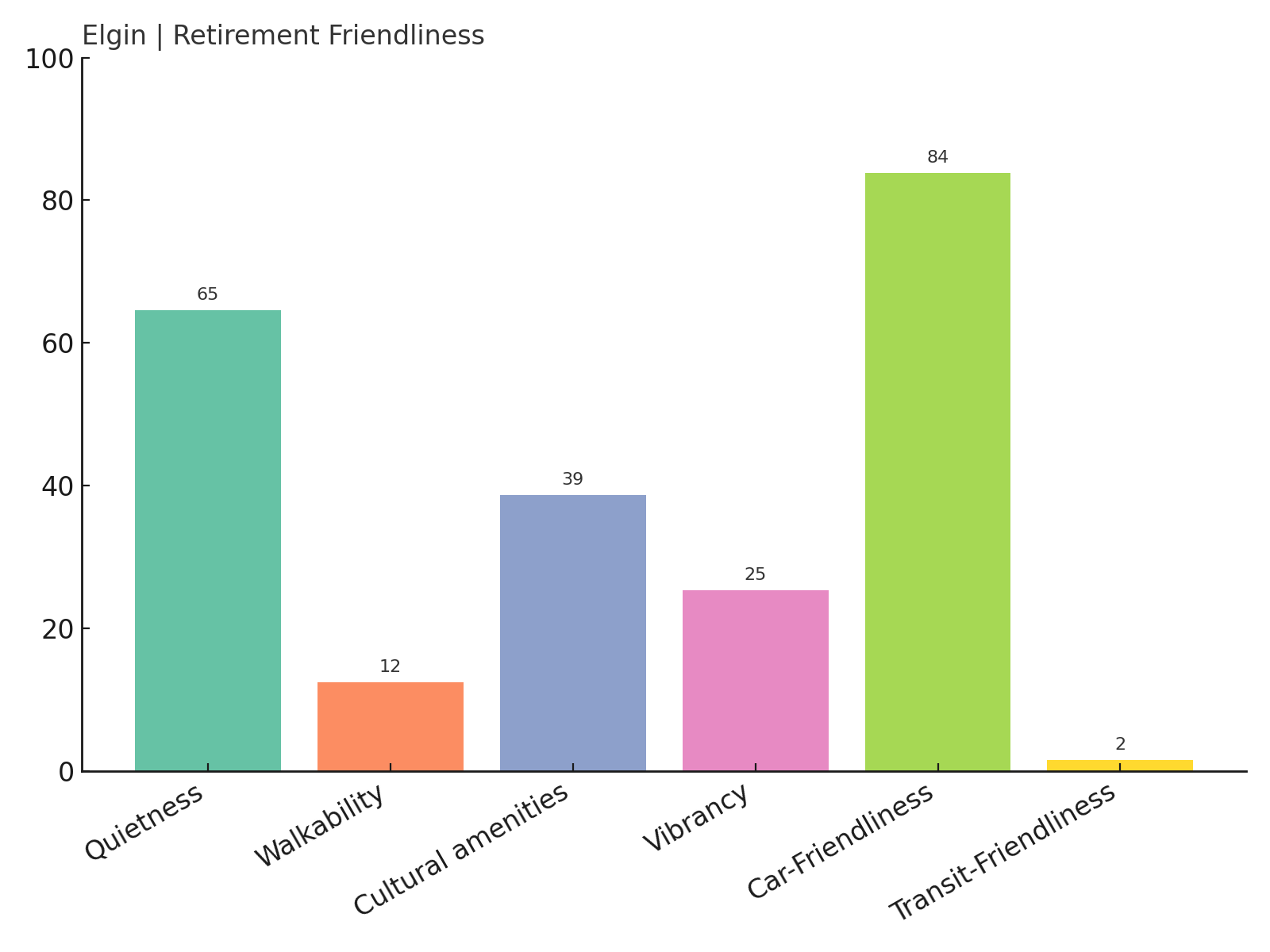
- Overall Retirement Score: 25.04
- Quietness: 64.61
- Walkability: 12.37
- Cultural amenities: 38.68
- Vibrancy: 25.32
- Car-Friendliness: 83.78
- Transit-Friendliness: 1.56
Elgin has decent cultural options and car-friendliness, but extremely low walkability and transit access make it a hard place for retirees to live independently. As it continues to grow, its lack of age-friendly planning may become an even bigger issue.
12. Norway – Quiet but Isolated

Norway, in Orangeburg County, is a small rural town with a close-knit feel. But for retirees, that charm comes with a catch: services are few and far between. There are very limited medical facilities, no real cultural events, and barely any commercial development.
With no local pharmacy or grocery store, seniors often rely on family members or must travel to neighboring towns for daily needs. Norway may appeal to lifelong locals or those with strong ties to the area, but it’s a tough fit for anyone hoping to retire into a supportive, active community.
Norway – ORS 24.3
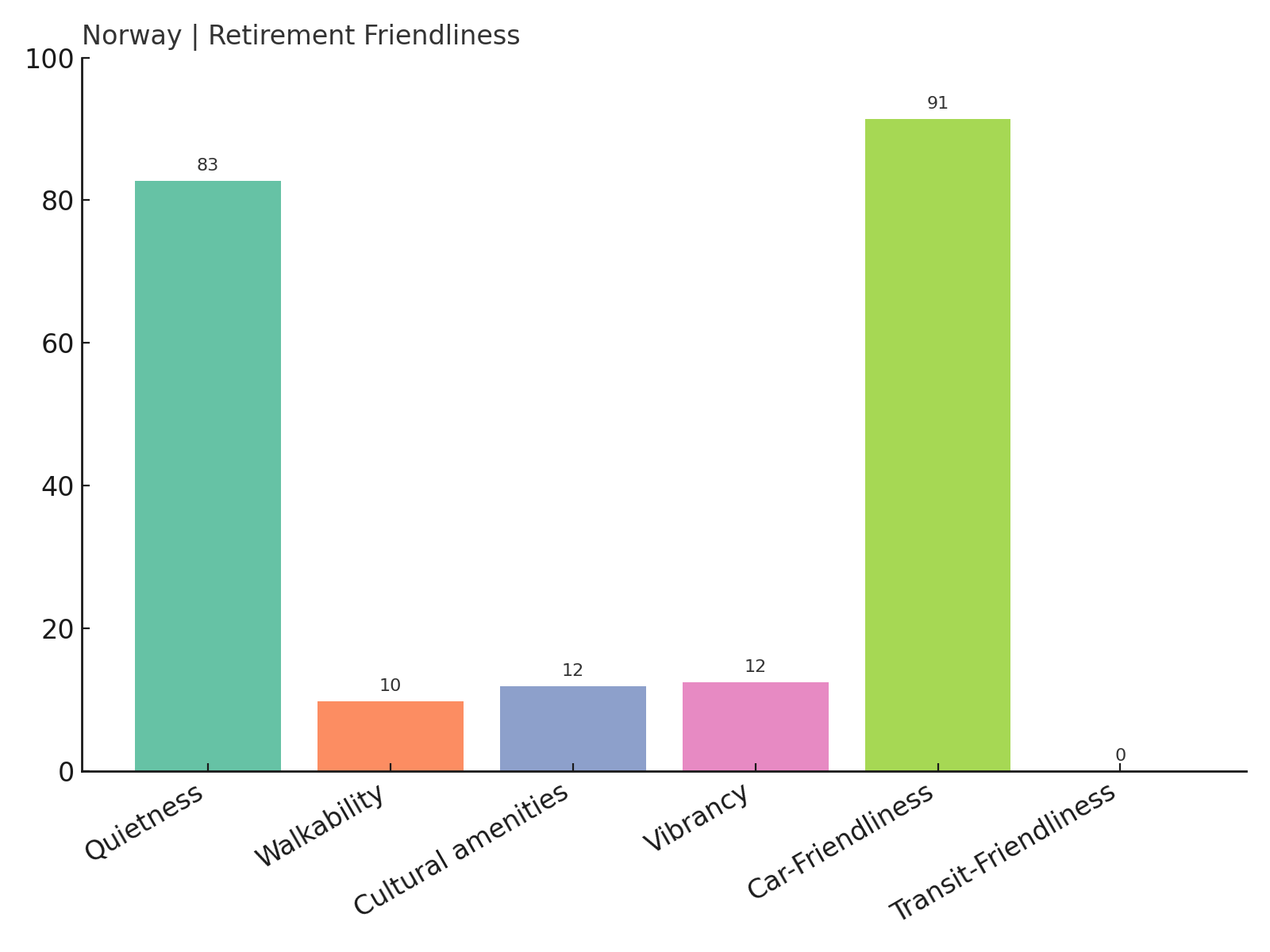
- Overall Retirement Score: 24.3
- Quietness: 82.68
- Walkability: 9.72
- Cultural amenities: 11.87
- Vibrancy: 12.37
- Car-Friendliness: 91.38
- Transit-Friendliness: 0.0
Norway ranks high for peace and car-friendliness but lacks nearly everything else. For older adults without a strong support network, the isolation and limited services make day-to-day living difficult.
11. Coosawhatchie – Bare Bones Basics

Located in Jasper County near the Georgia border, Coosawhatchie is more of a hamlet than a town. It offers historical charm and a peaceful pace, but there’s virtually no infrastructure to support a thriving retired population. No grocery store, no pharmacy, and only the most basic services are within reach.
Its remote location and small population mean few opportunities for social engagement or cultural activities. This is a place where you bring everything with you—or do without. It’s tranquil, but in a way that may feel more limiting than liberating for seniors.
Coosawhatchie – ORS 23.62
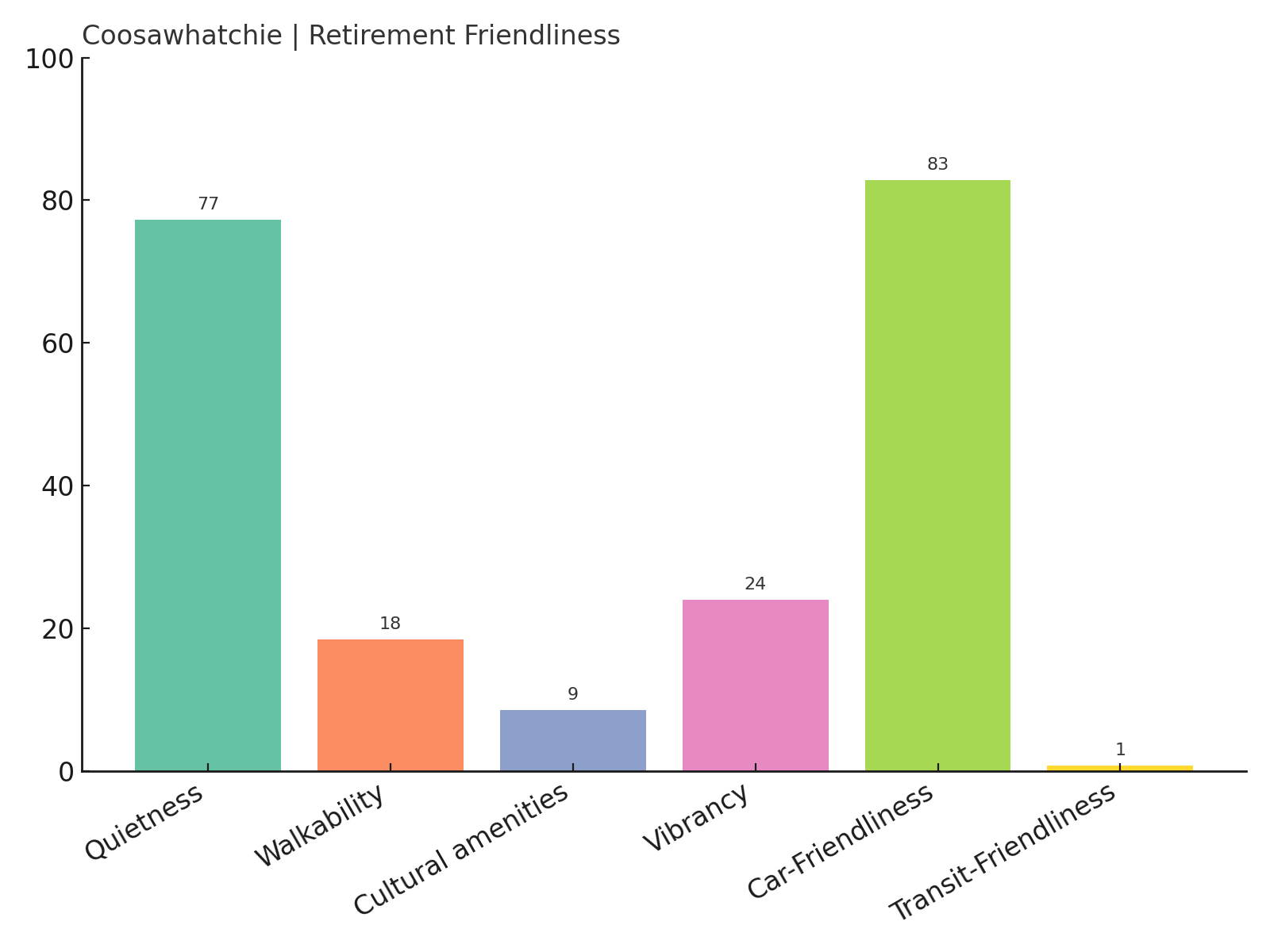
- Overall Retirement Score: 23.62
- Quietness: 77.3
- Walkability: 18.43
- Cultural amenities: 8.56
- Vibrancy: 23.98
- Car-Friendliness: 82.8
- Transit-Friendliness: 0.76
Coosawhatchie offers quiet and car accessibility, but with low vibrancy and walkability, it’s far from ideal for retirees who want more than just stillness. Services are minimal, and there’s not much to do without driving out of town.
10. Turbeville – Services Spread Thin
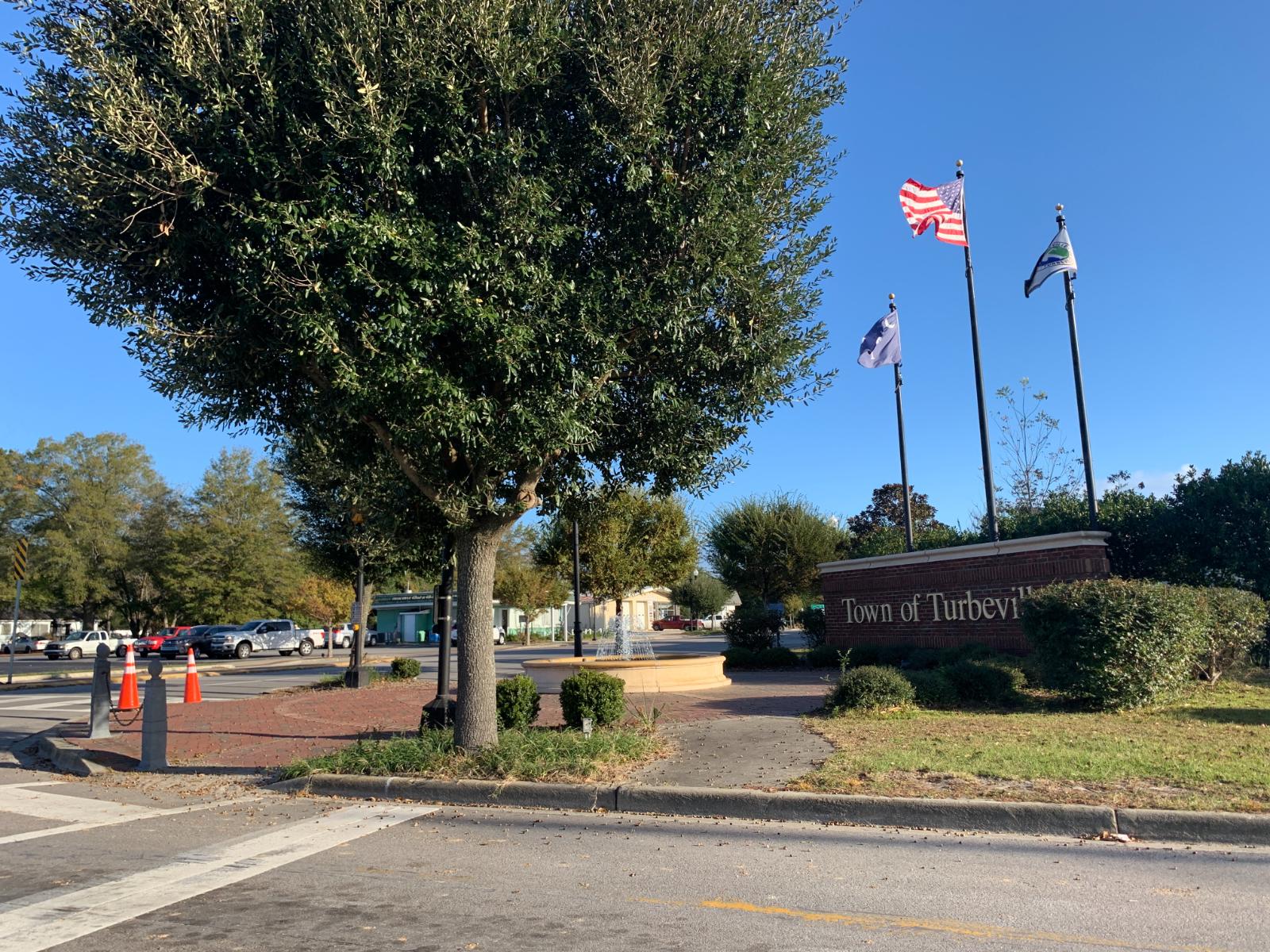
Turbeville sits in Clarendon County and is best known for its proximity to I-95. While it’s easy to get to, there’s not much waiting for retirees once they arrive. Medical facilities are scarce, and the town’s few shops and eateries are widely spaced, making walking impractical for daily errands.
It does have some activity, thanks to its location near major roadways, but the town itself doesn’t offer much in the way of cultural life or senior-focused programs. Without a car, getting around here would be extremely difficult.
Turbeville – ORS 23.49
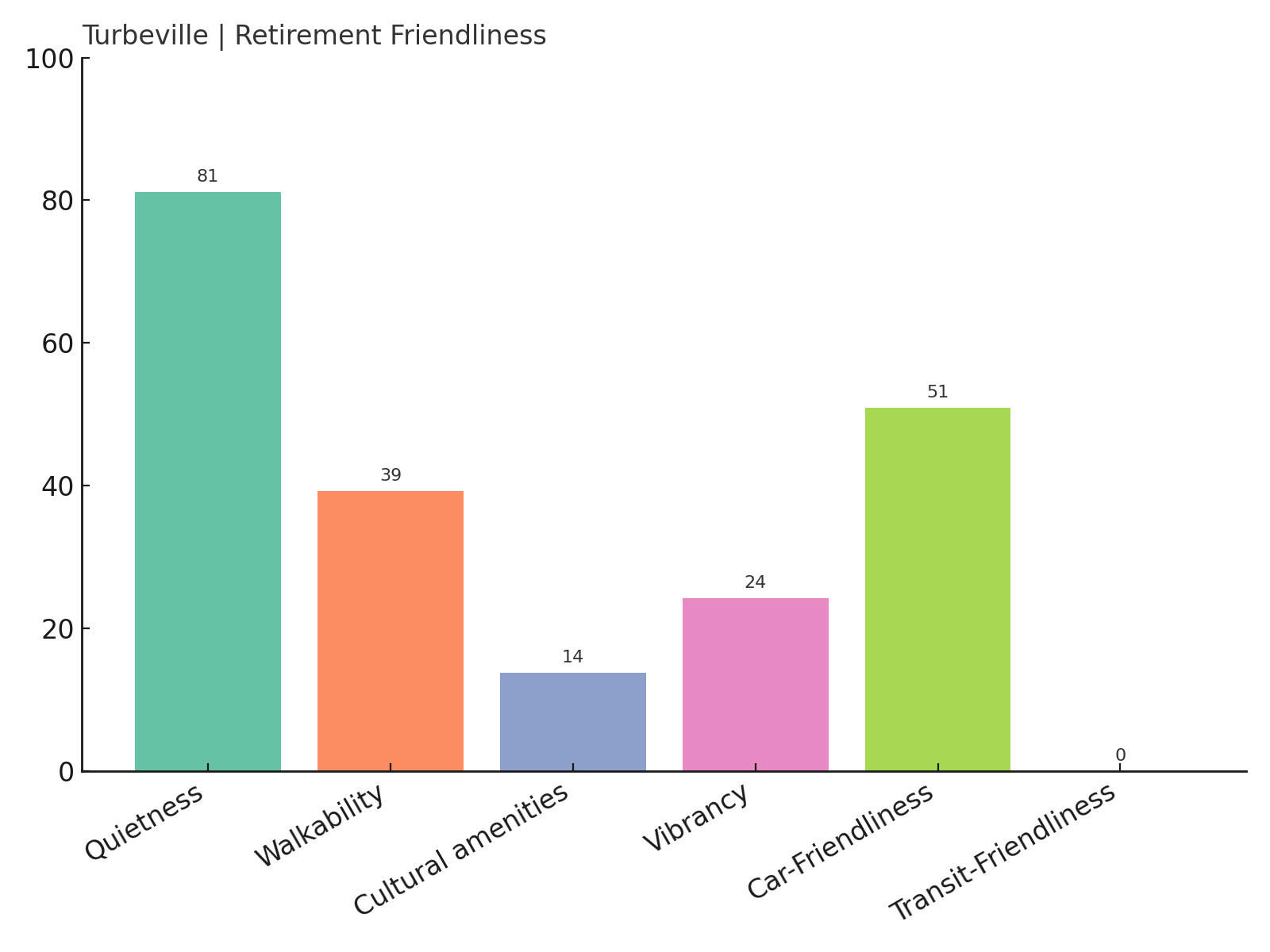
- Overall Retirement Score: 23.49
- Quietness: 81.19
- Walkability: 39.28
- Cultural amenities: 13.73
- Vibrancy: 24.18
- Car-Friendliness: 50.89
- Transit-Friendliness: 0.0
Turbeville has decent quietness and a moderate level of walkability, but with low car-friendliness and no transit, it presents a logistical challenge. Retirees looking for ease and accessibility will find daily life here more complicated than expected.
9. Rowesville – A Quiet Life, Maybe Too Quiet

Would you like to save this?
Rowesville is a small rural town in Orangeburg County that offers little more than peaceful surroundings. While some retirees may enjoy the slow pace and small-town charm, others may find the extreme quiet isolating. There are virtually no businesses, healthcare services, or recreational outlets within the town limits.
The community is largely residential and spread out, and public services are minimal at best. For older adults who enjoy staying busy or need regular access to care, Rowesville simply doesn’t meet the mark.
Rowesville – ORS 22.33
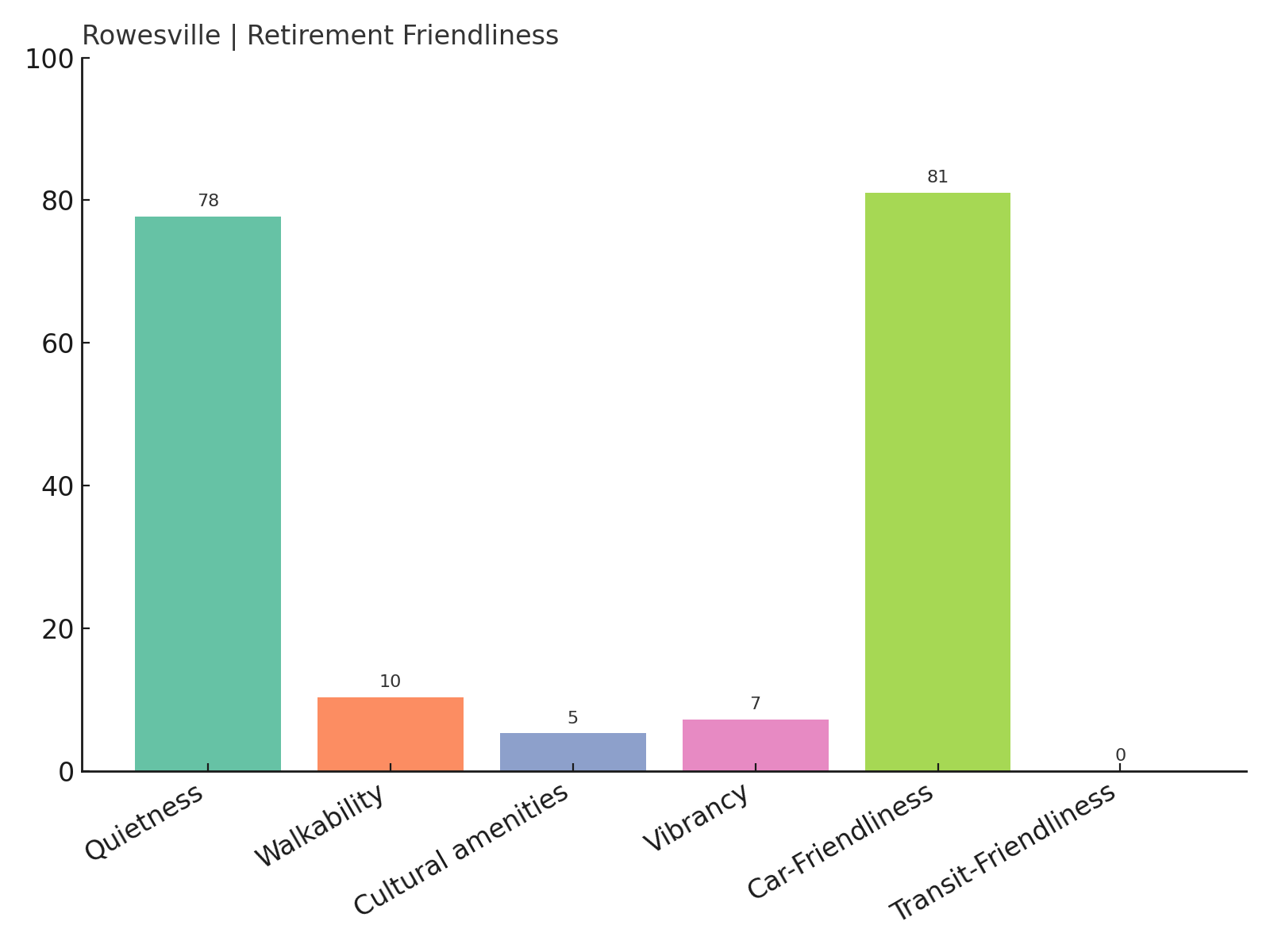
- Overall Retirement Score: 22.33
- Quietness: 77.67
- Walkability: 10.33
- Cultural amenities: 5.25
- Vibrancy: 7.15
- Car-Friendliness: 81.07
- Transit-Friendliness: 0.0
Despite its decent quietness, Rowesville’s extremely low vibrancy and limited services make it a tough place for active or socially-minded retirees. The lack of walkability and transit adds to the challenge of aging in place here.
8. Langley – Car-Focused, Little Community Feel

Langley, located in Aiken County near the Georgia border, is part of the broader Horse Creek Valley area. While it sits in a region with a strong industrial and working-class history, it hasn’t evolved into a particularly retirement-friendly place. The area is heavily car-centric, with few pedestrian-friendly zones and scattered services that make daily life inconvenient for seniors.
While Langley offers some cultural access thanks to nearby Augusta and Aiken, the town itself lacks a cohesive community atmosphere. There’s no central hub, no senior centers, and limited opportunities for older adults to stay engaged without a car.
Langley – ORS 22.19
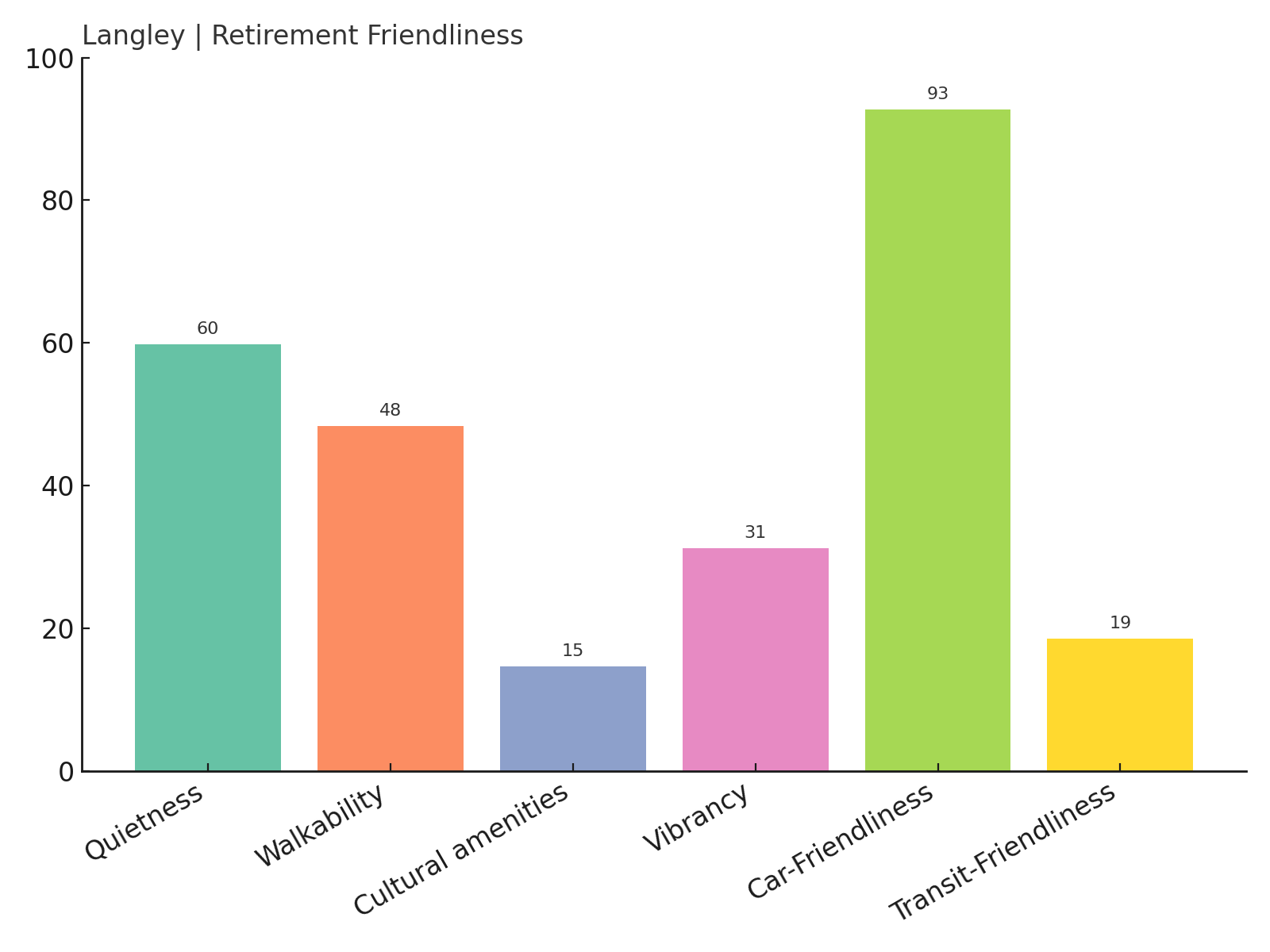
- Overall Retirement Score: 22.19
- Quietness: 59.84
- Walkability: 48.35
- Cultural amenities: 14.65
- Vibrancy: 31.27
- Car-Friendliness: 92.77
- Transit-Friendliness: 18.52
Langley stands out with high scores for car-friendliness and decent walkability, but that doesn’t translate into livability for retirees. The low quietness and limited senior-oriented amenities make it feel more like a commuter zone than a retirement destination.
7. Starr – Sleepy and Service-Light

Starr is a quiet agricultural town in Anderson County, sitting close to Lake Hartwell and the Georgia line. While the natural beauty and peaceful pace may be appealing to some, Starr’s small size means there’s little infrastructure in place to support an aging population. There are no local hospitals, limited shopping, and almost no walkable or social features.
It’s a place where neighbors know each other, but public amenities are minimal and spread thin. For retirees who need more than just quiet, Starr doesn’t offer the engagement or accessibility that make aging easier.
Starr – ORS 20.57

- Overall Retirement Score: 20.57
- Quietness: 61.61
- Walkability: 9.32
- Cultural amenities: 10.9
- Vibrancy: 13.99
- Car-Friendliness: 97.99
- Transit-Friendliness: 7.17
Starr ranks very high for car-friendliness but falls short in almost every other category. It’s simply not equipped to handle the needs of retirees without strong personal support systems in place.
6. Gloverville – Warrenville – Outdated and Overlooked

The neighboring communities of Gloverville and Warrenville, located just outside Aiken, were once thriving mill towns. Today, much of their infrastructure feels dated, and the area hasn’t kept up with modern planning or senior-focused amenities. The housing stock is aging, public services are limited, and the area lacks the walkable, vibrant feel that makes retirement living enjoyable.
While nearby Aiken offers some resources, within Gloverville-Warrenville itself there are very few programs or services targeted at older adults. Seniors who live here will find themselves reliant on cars for nearly everything—and not much to drive to.
Gloverville – Warrenville – ORS 17.94
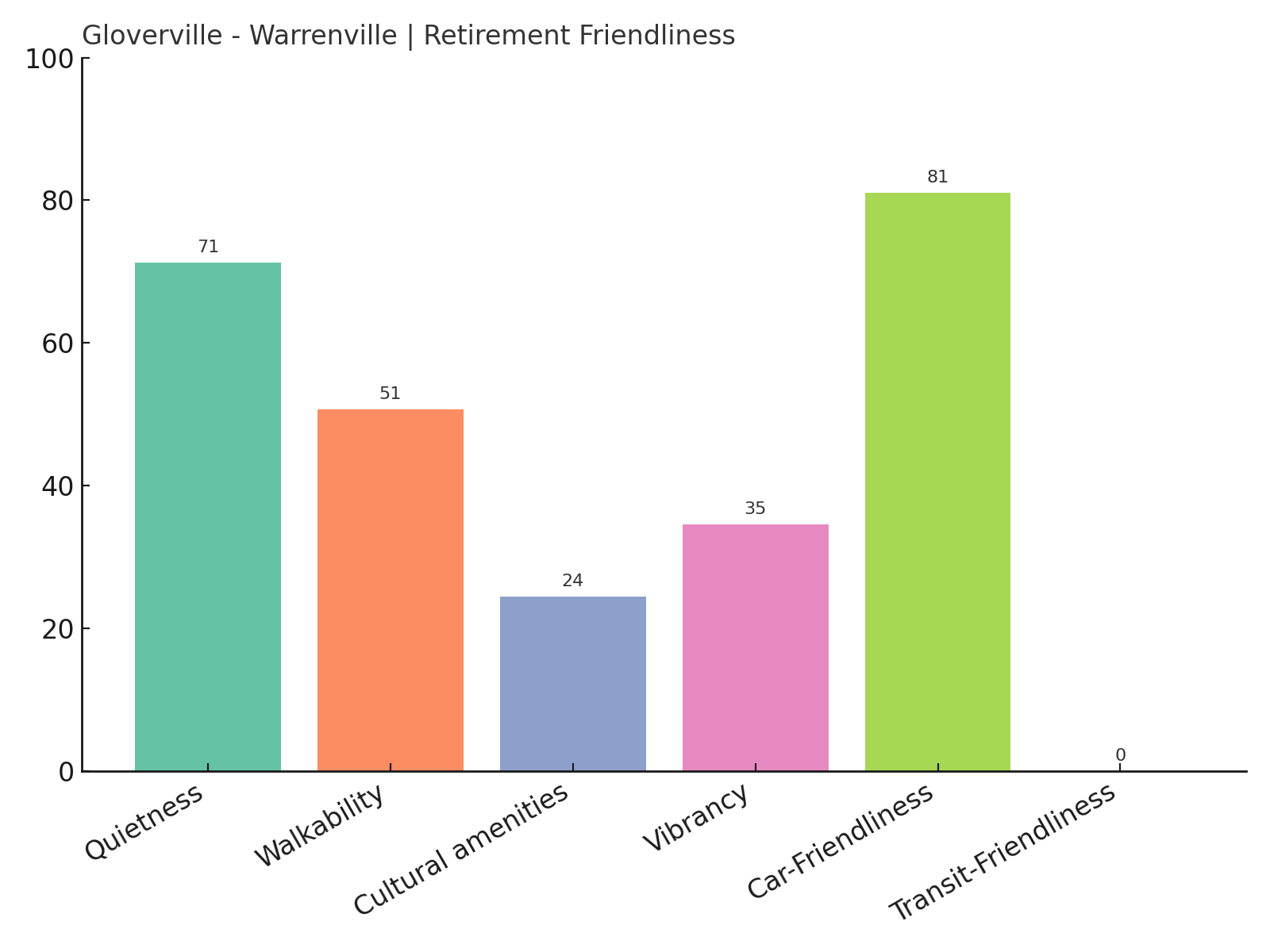
- Overall Retirement Score: 17.94
- Quietness: 71.25
- Walkability: 50.66
- Cultural amenities: 24.49
- Vibrancy: 34.57
- Car-Friendliness: 81.08
- Transit-Friendliness: 0.0
Despite better-than-average walkability, the low scores for transit and outdated services hold this area back. Gloverville-Warrenville feels more like a place that retirees pass through, not settle in.
5. Buffalo – Declining Amenities, Low Support

Buffalo is a census-designated place in Union County that was historically built around the textile industry. As jobs moved out, services did too—and today, the area struggles with limited access to shopping, healthcare, and cultural outlets. For retirees, this means fewer options for daily needs and almost no support for aging in place.
The small-town charm is still there, but the infrastructure has not kept pace with modern expectations. Without nearby hospitals or a strong community center, Buffalo can feel more isolating than inviting for seniors.
Buffalo – ORS 17.53
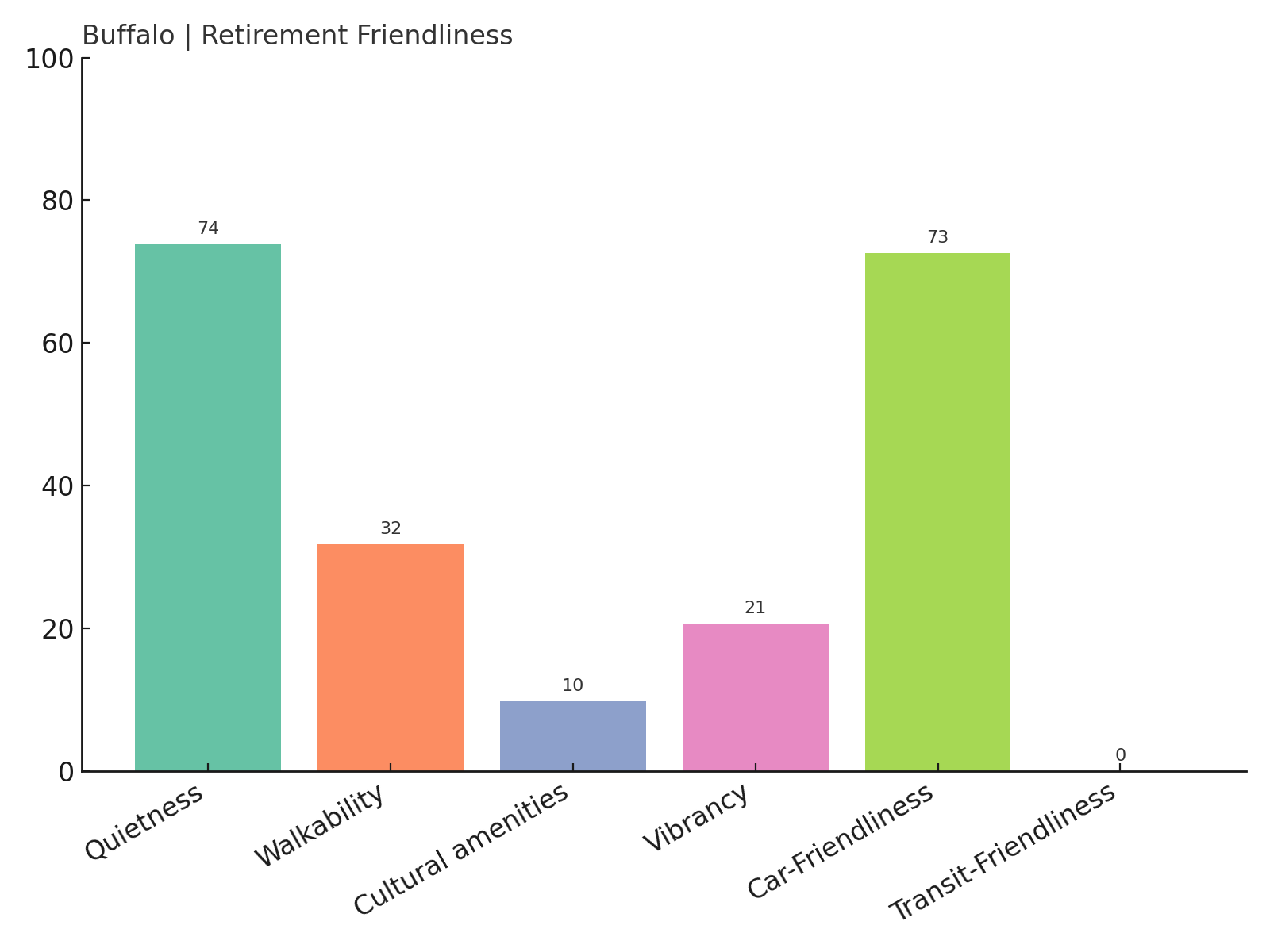
- Overall Retirement Score: 17.53
- Quietness: 73.79
- Walkability: 31.73
- Cultural amenities: 9.81
- Vibrancy: 20.64
- Car-Friendliness: 72.6
- Transit-Friendliness: 0.0
Buffalo offers a quiet atmosphere, but that’s about all. With weak walkability, low cultural access, and no transit, retirees here may find themselves cut off from the conveniences they once took for granted.
4. Vance – High Dependence, Low Access
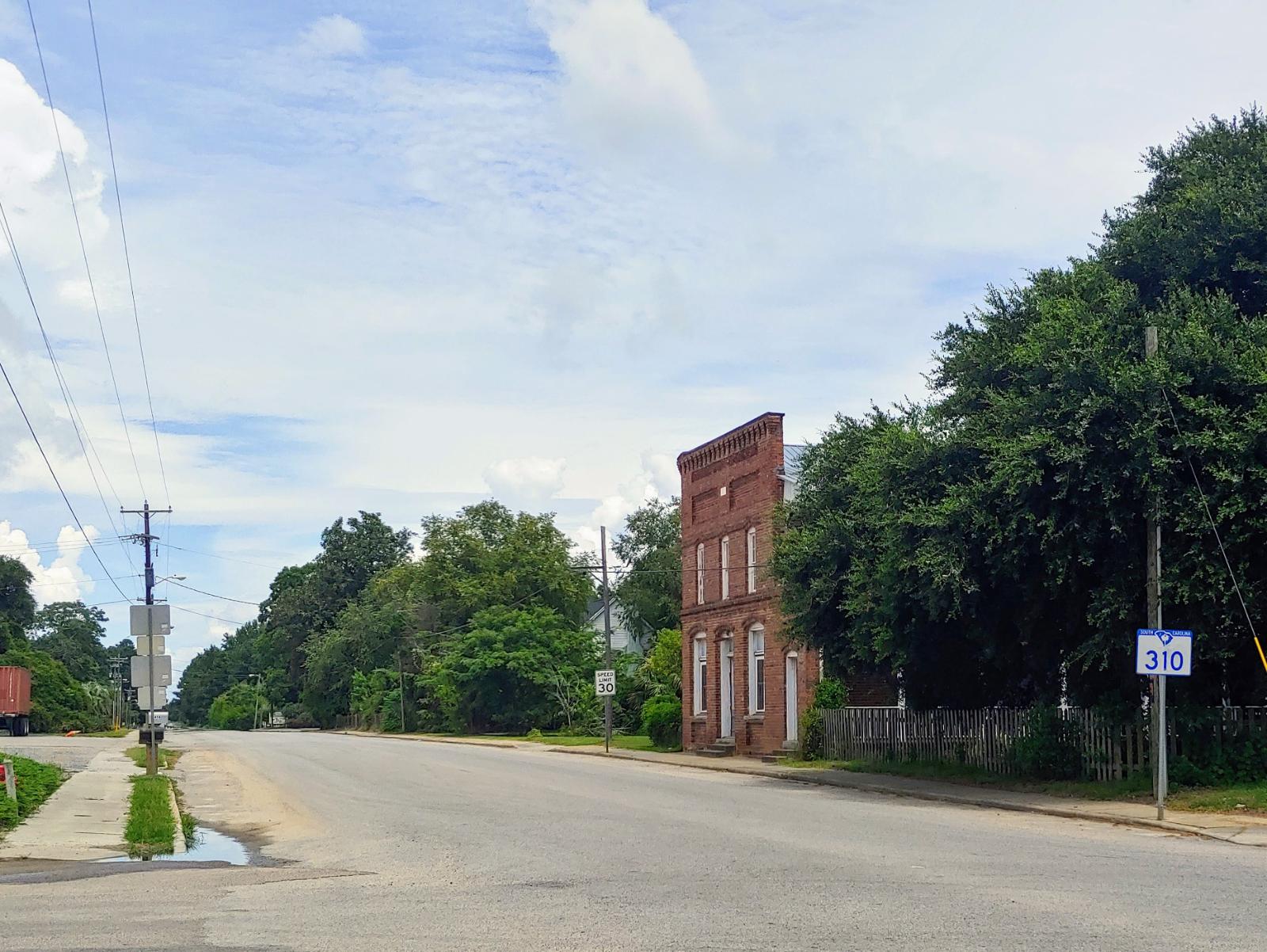
Vance is a small town in Orangeburg County near Lake Marion, known mostly as a pass-through spot for boaters and travelers. For retirees, however, it offers very little. There’s no walkable downtown, few services, and minimal public resources. The closest medical and shopping options are several miles away, and there’s almost no infrastructure aimed at supporting an older population.
Though the lakefront may appeal to some, daily life without a vehicle would be nearly impossible. And even with a car, the lack of amenities means long drives for basics—making Vance a difficult place to call home in retirement.
Vance – ORS 17.48
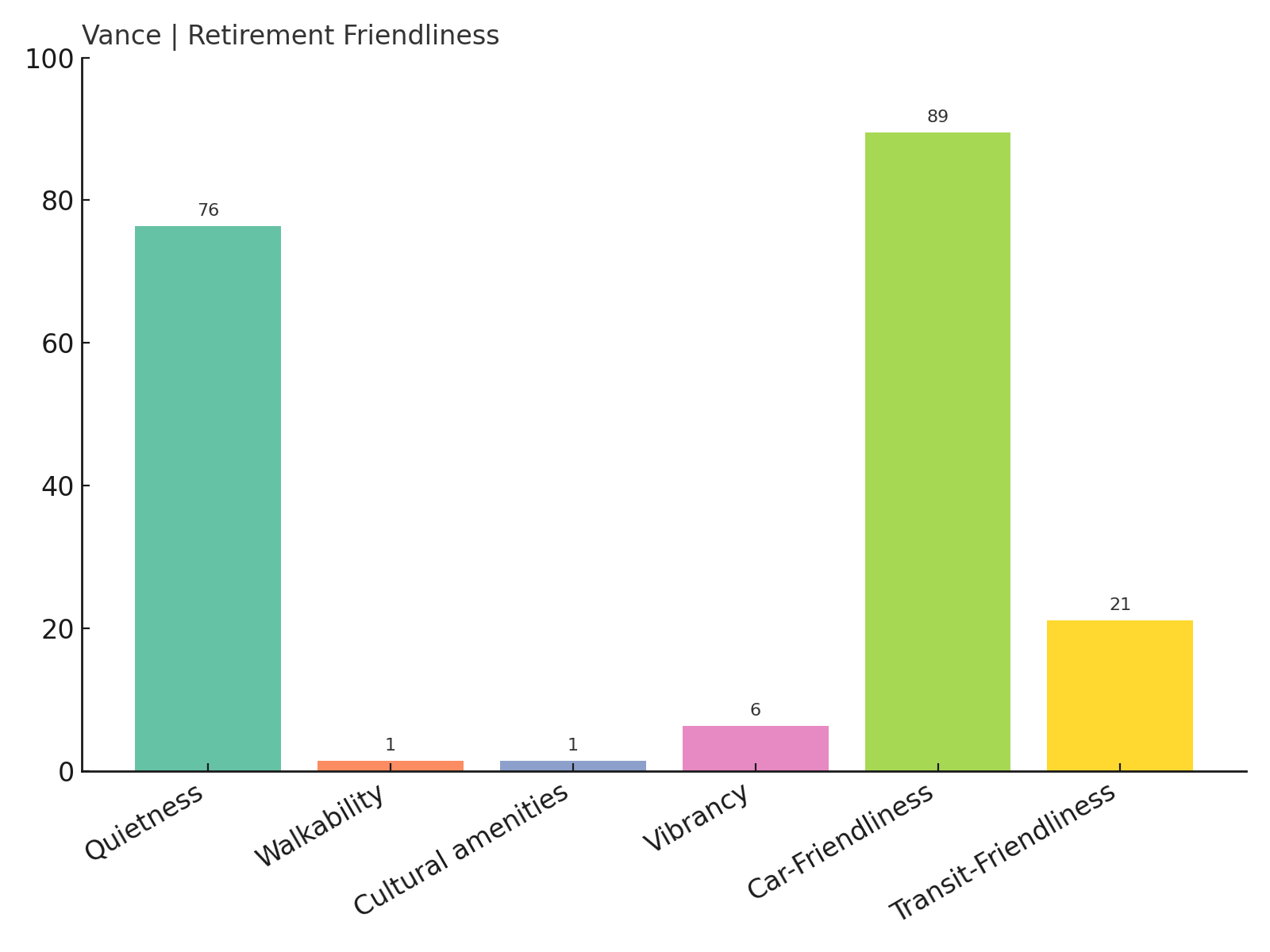
- Overall Retirement Score: 17.48
- Quietness: 76.35
- Walkability: 1.42
- Cultural amenities: 1.43
- Vibrancy: 6.34
- Car-Friendliness: 89.47
- Transit-Friendliness: 21.08
Despite decent quietness and car access, Vance’s extremely low walkability and lack of cultural life make it unsuitable for most retirees. It’s a town where you’re expected to bring everything with you—because not much is available locally.
3. Arcadia – Not Built for Retirement

Arcadia, in Spartanburg County, is a small community shaped by its industrial past. While it’s close to the city of Spartanburg, Arcadia itself has seen little investment in recent years. There’s no central downtown area, few public amenities, and minimal support systems for aging residents. Basic errands often require driving, and the streets aren’t pedestrian-friendly.
The town also lacks a sense of community engagement. There are few opportunities for older adults to take part in cultural, recreational, or social activities nearby. Despite its proximity to a larger city, Arcadia hasn’t developed the infrastructure or atmosphere to make retirement easy or enjoyable.
Arcadia – ORS 13.46
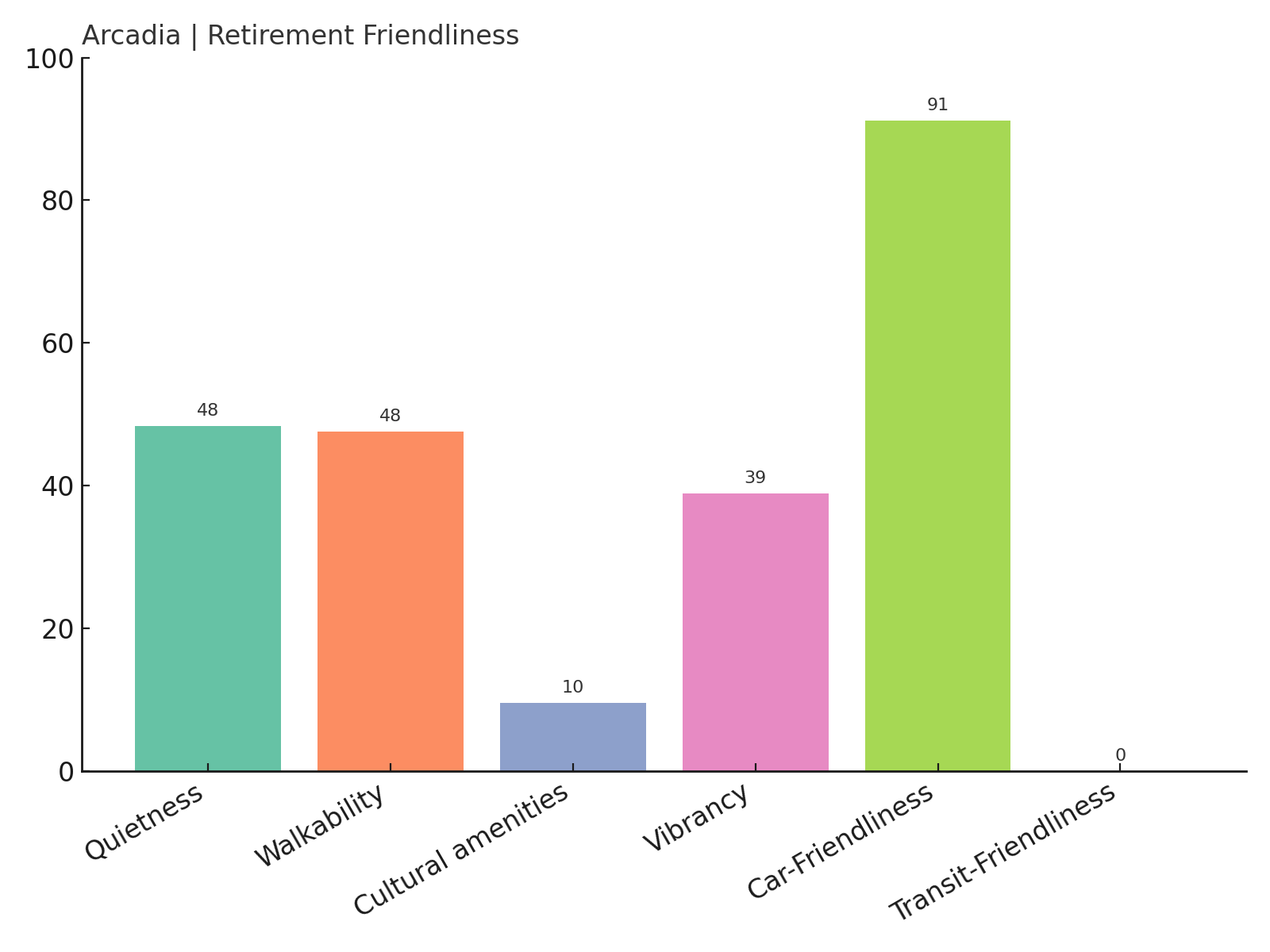
- Overall Retirement Score: 13.46
- Quietness: 48.3
- Walkability: 47.57
- Cultural amenities: 9.56
- Vibrancy: 38.89
- Car-Friendliness: 91.19
- Transit-Friendliness: 0.0
Arcadia’s relatively strong vibrancy and walkability don’t tell the full story. With low quietness and limited cultural depth, it falls short of being a true retirement destination—especially for those seeking peace and access to senior resources.
2. Martin – Remote and Severely Underserved

Martin is a rural outpost in Allendale County, tucked near the Georgia border. For retirees, its remote location creates more problems than peace. The area lacks basic infrastructure—there are no major medical centers, minimal retail options, and no senior services of note. Even internet and cellular connectivity can be spotty.
The nearest town with a grocery store or pharmacy is a long drive away. For those without strong family support or a reliable vehicle, Martin can feel cut off from the rest of the world. It’s the kind of place where aging in place requires serious planning and personal resources.
Martin – ORS 7.13
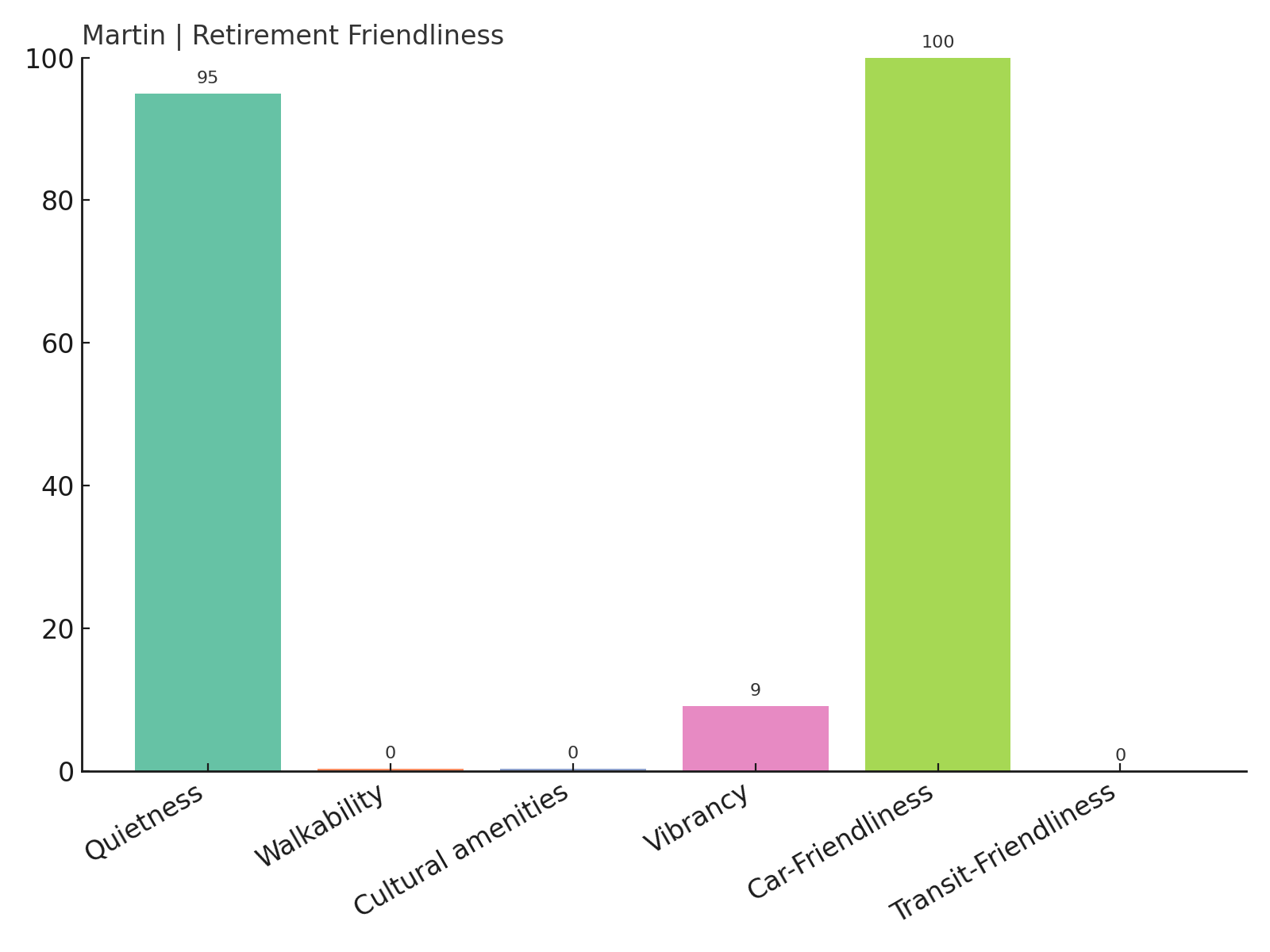
- Overall Retirement Score: 7.13
- Quietness: 94.96
- Walkability: 0.31
- Cultural amenities: 0.33
- Vibrancy: 9.09
- Car-Friendliness: 100.0
- Transit-Friendliness: 0.0
Martin ranks extremely low in almost every retirement metric except for quietness and car-friendliness. Its lack of walkability, culture, and health access makes it one of the most challenging places to retire in the state.
1. Salters – A Retirement Dead End

Salters, located in Williamsburg County, tops the list as South Carolina’s least retirement-friendly town in 2025. The town is extremely small, with almost no public amenities, services, or senior-oriented infrastructure. There are no shops, no clinics, no libraries—just a scattering of houses and long roads stretching between them.
Despite surprisingly high walkability scores, that walkability doesn’t translate into usable access. There’s simply nowhere to walk to. Retirees in Salters face a complete lack of support, engagement, and healthcare access. It may be quiet, but it’s not livable—especially for older adults needing even the most basic services.
Salters – ORS 3.5
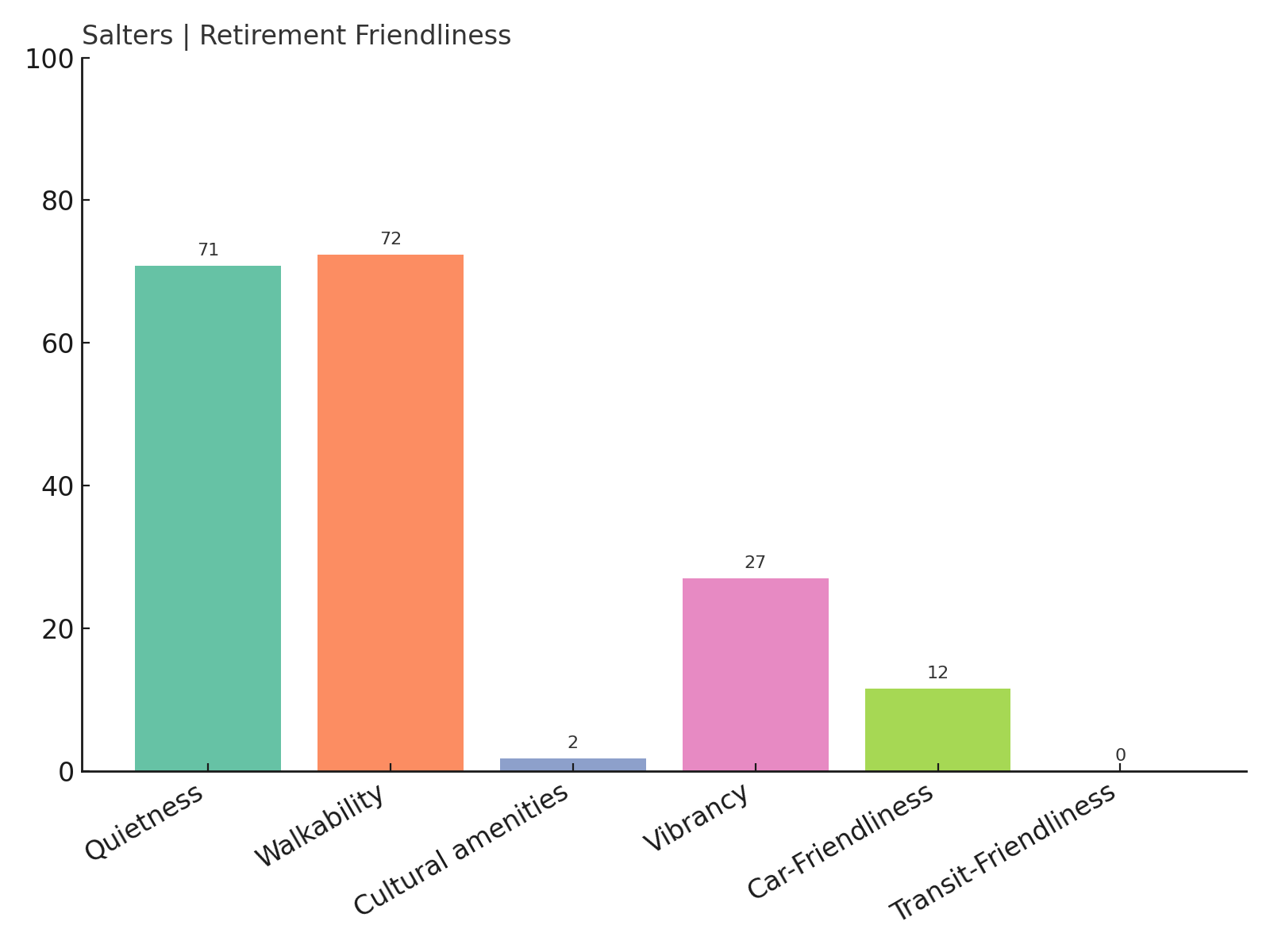
- Overall Retirement Score: 3.5
- Quietness: 70.84
- Walkability: 72.42
- Cultural amenities: 1.73
- Vibrancy: 27.01
- Car-Friendliness: 11.59
- Transit-Friendliness: 0.0
Salters has the lowest ORS in the entire state, with weak car access and no services to speak of. Its high walkability score is a little misleading—there’s little to access on foot, and even less to support a fulfilling retirement.
In addition to our proprietary data, we used the following for the median home price information:
- Redfin South Carolina Housing Market Report https://www.redfin.com/state/South-Carolina/housing-market
- Zillow South Carolina Home Values https://www.zillow.com/home-values/51/sc/
- NORADA Real Estate South Carolina Housing Market https://www.noradarealestate.com/blog/south-carolina-housing-market/
- Houzeo South Carolina Housing Market https://www.houzeo.com/blog/south-carolina-real-estate-market/
- Bankrate South Carolina Housing Market https://www.bankrate.com/real-estate/housing-market/sc/
- Jeff Cook Real Estate Average Home Price in South Carolina https://www.jeffcookrealestate.com/blog/average-home-price-in-south-carolina-current-trends/
- Stacker Cities with Fastest-Growing Home Prices in South Carolina https://stacker.com/stories/south-carolina/cities-fastest-growing-home-prices-south-carolina
- The Motley Fool Average House Price by State https://www.fool.com/money/research/average-house-price-state/

